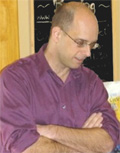
Musings Joe Mills —Back to Orsorum Contents/Issue Links— |
The Surprising Advantages of Being a PoetPay-Offs of an Occupation that Doesn’t Pay
by Joe Mills
A fter the publication of my first volume of poetry, my publisher sent a royalty check with a note apologizing for its small size. I thought he was joking—not about the amount, but about the apology. To receive any check for poetry seemed, as Vizzini in Princess Bride says, “inconceivable.” In fact, what I like about being a poet are the low expectations. When I promote other types of books, I always have high hopes. On my way to an event, I will envision signing big stacks. But no matter how many I sell, it’s rarely as many as I had hoped. Consequently, I drive home slightly depressed. In contrast, at poetry events, I never expect to sell anything. A person buying just one copy puts me in a good mood. When once I sold ten, everything the store had, it made me delirious. Afterwards, I thought wildly, “I bet I could have sold eleven. Maybe twelve!” I don’t expect to make enough money from poetry to pay my coffee expenses, nor do I expect to meet people who have actually read the work itself. Someone once said publishing poems and waiting for a response is like throwing a feather into the Grand Canyon and trying to hear it hit bottom. And I like it that way. When you don’t think anyone is listening to your singing, you feel free to mess around. You don’t worry about being cool, hurting someone’s feelings, or trying to sound smart. When I do meet readers, it can be unsettling. A stranger quoted a line of my poetry at a party once, and I found it disorienting. It took me a moment to recognize the words. Maybe this was because she didn’t have the mocking tone that I usually hear when my prose get repeated. This is another advantage of poetry. People have attacked me for my non-fiction and academic criticism, but I’ve never had someone argue about a poem. Non-poets probably don’t criticize poems because the genre comes with well-established defenses. There is, for example, “poetic license.” Apparently I can say whatever I want however I want because “it’s poetry.” My father once asked my brother about some puzzling aspects of my work. The poem “The Only Photograph I Have of My Father” describes a specific photograph of him, but he knew I have lots of other ones. Then there were details that seemed to be about our family mingled with ones that clearly weren’t. When my brother explained, “It’s poetry,” my father was satisfied.
There are other useful stereotypes. Cultivate the persona of “a poet,” and you can wear mismatched clothes and be casual about personal hygiene. I once heard a departmental secretary ask about someone, “Is he homeless or a poet?” You don’t have to mingle, you’re forgiven for inappropriate comments or seeming non sequiturs, and people aren’t surprised by irresponsible behavior. When you’re a poet, you can act oddly, but a bigger payoff lies in the opposite dynamic. Since no one expects you to have social skills, if you can actually have a normal conversation, people think you’re terrific. Crack a joke, and you’re Jerry Seinfeld. Or, as the father of an old girlfriend said of me, “He writes poetry, but don’t get me wrong, he knows his sports.”
No matter how you act, few feel threatened by a poet. Even other writers, a group that can jealously compare contracts and royalties, don’t regard you as competition. When an author asked about my book and I explained it was poetry, she patted my arm and said, “Oh, Good for you! Good for you!” Ironically, even I sometimes have this condescending attitude. Sitting in a Borders with my publisher, I mentioned that the store didn’t have my book. He responded, puzzled, “I just called, and they said it was in stock.” We investigated, and, as I once again scanned the “Local Authors” shelf, I heard him say from another aisle, “Here it is.” I tried to act casual at seeing my name between Millay and Milosz, but I was stunned. I had been checking the equivalent of the “Support Local Bands” bin. It never occurred to me that I would be in “Literature.” The rest of the day I walked around dazed.
The bar can’t get much lower. As a poet, I don’t even have to sell my work to exceed my expectations; just put it on the shelf among impressive company, and I’m happy. | ||
|
|
|||